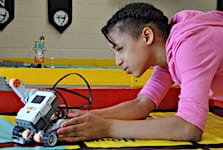https://vimeo.com/291147318
Bringing STEM principles to the arts and vice versa  Dr. Michelle Zimmerman has more than 18 years of classroom teaching experience, and is currently on the rise as a recognized expert in teaching STEM in K-12. I sat down with her recently to talk about the current state of STEM education, a subject she will be discussing in depth in a handful of sessions at the 2019 Future of Education Technology Conference (FETC) in Orlando, Florida from January 27th through the 30th.
Dr. Michelle Zimmerman has more than 18 years of classroom teaching experience, and is currently on the rise as a recognized expert in teaching STEM in K-12. I sat down with her recently to talk about the current state of STEM education, a subject she will be discussing in depth in a handful of sessions at the 2019 Future of Education Technology Conference (FETC) in Orlando, Florida from January 27th through the 30th.
Dr. Zimmerman warns that for STEM to be successful in the classroom, it takes more than having separate science, technology, engineering, and math programs. The secret is for all the disciplines and subjects to cross their own boundaries and make connections. She says we want to ensure that students are taking the ideas and content from a math or science class and successfully transferring that knowledge and those equations and procedures into another domain, such as art or engineering, to inspire new ideas. She says it’s not about the equipment as much as the mindset because it’s effectively implemented even in schools that have very few material resources.
“In some areas, I would say that we’re advancing quite a bit in the way that we’re getting young people to think about the intersection of those different subjects and domains and working through collaboration and getting insights from actual experts in the field,” Dr. Zimmerman says. “We want them to be able to explain what they’re doing and why.” She wants them to demonstrate that their grasp of knowledge should go beyond “I passed the test” or “I was able to do a simple basic replication type of experiment.” She believes they need to show that they understand the basic principles and how they mesh together in the real world for STEM education to be truly deemed successful.
Dr. Zimmerman realizes that in a perfect STEM world, teachers would not have a subject or discipline label and they would combine multiple subject domains. It would be their task to help the student find out how and where the different subjects intersect. “As long as we’re having people become specialists in only one area (of education) we’re going to develop a mindset of educators feeling like ‘I only teach science’ or ‘I only teach English’ or ‘I only teach the arts,’” Dr. Zimmerman says. “And asking them to do anything beyond that becomes scary to them.” Because of the current climate of assessment and standardized testing, it opens up a frightening realm of not meeting expectations and bad year-end evaluations. Teachers fight to stay in their subject and comfort zone, and this starts creating silos in the school that defeats a cross-discipline approach to STEM.
 Training educators is a daunting task under the best of circumstances. They need to have a broad field of experience to make a cross-discipline approach to STEM work, either through university or training. One of the first obstacles to overcome is the way the subject itself is taught. “If we get so locked into saying, ‘This is the one and only way of doing or approaching the subject or topic,’ we miss the opportunities to practice looking across multiple domains and finding those connections that help solve problems.”
Training educators is a daunting task under the best of circumstances. They need to have a broad field of experience to make a cross-discipline approach to STEM work, either through university or training. One of the first obstacles to overcome is the way the subject itself is taught. “If we get so locked into saying, ‘This is the one and only way of doing or approaching the subject or topic,’ we miss the opportunities to practice looking across multiple domains and finding those connections that help solve problems.”
When asked about a place for the arts, turning STEM to STEAM, Dr. Zimmerman fully agrees. When it comes to the creative side of STEM, the arts are critically important in her estimation. “My brother gave me the perfect analogy of jazz musicians,” she smiles. “He said that you think of playing jazz more like an improvisation. You have a song, you have a set progression of where you’re going with it, you know your end goal, but at the same time, you draw from all your experiences of other songs and pieces to bring in a riff or bring in a sound from a very different piece.”
Dr. Zimmerman recognizes the importance of looking at the way people process information and create in the arts as it relates to STEM. The intellectual and psychological challenges, the multiple iterations of design and prototyping, critique and feedback are essential tools and mechanisms that can directly inform the way we’re helping students combine different STEM subjects to solve the problems of the future.
About Dr. Michelle Zimmerman
 Michelle Zimmerman, Ph.D., has taught all grades from Pre-K through 10th with a focus on middle and high school since 2009. She has presented her research across the US and Canada since 2007, FETC, ISTE, TCEA, NCCE, CRESST, BLC, NNSTOY, The Learning Counsel, SXSWedu, New York Academy of Sciences, UCLA, NYU, and AERA among others The evidence of her original research and theory into practice can be seen in designing Renton Prep.
Michelle Zimmerman, Ph.D., has taught all grades from Pre-K through 10th with a focus on middle and high school since 2009. She has presented her research across the US and Canada since 2007, FETC, ISTE, TCEA, NCCE, CRESST, BLC, NNSTOY, The Learning Counsel, SXSWedu, New York Academy of Sciences, UCLA, NYU, and AERA among others The evidence of her original research and theory into practice can be seen in designing Renton Prep.
She was thrilled to see the school become FETC STEM Excellence Award Finalist for 2016 as top 3 STEM Middle Schools, Microsoft Flagship School, and receiving multiple education awards. She is Microsoft Innovative Educator Expert and Surface Expert.
Dr. Michelle Zimmerman will be a featured presenter at the 2019 Future of Education Technology Conference (FETC) from January 27th-30th in Orlando, Florida. The conference will bring together thousands of educators and technology leaders for an intensive, highly collaborative exploration of new technologies, best practices and pressing issues. Registration is now open.
Dr. Zimmerman will be a presenter for the following five sessions:
- $W137 | STEM, Culture, and Business Skills Through Experiential Learning at Disney
- C308 | On Trial: What I Learned About School Law and Cyberbullying
- $W265 | Artificial Intelligence: Will AI Really Automate School IT?
- C257 | Design Thinking: Pop Culture and Artificial Intelligence
- $W282 | Design Thinking and Disney Innovation






